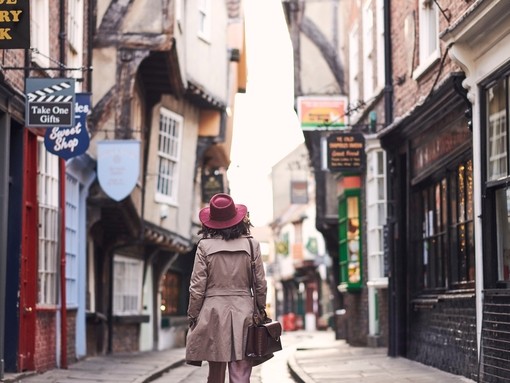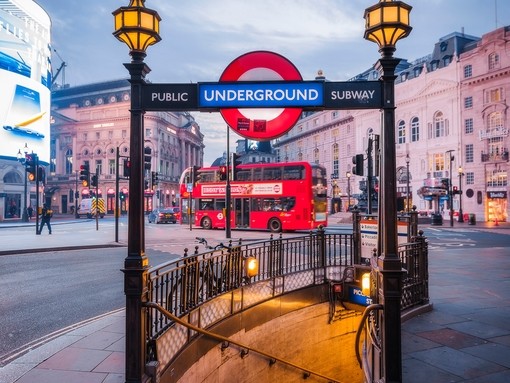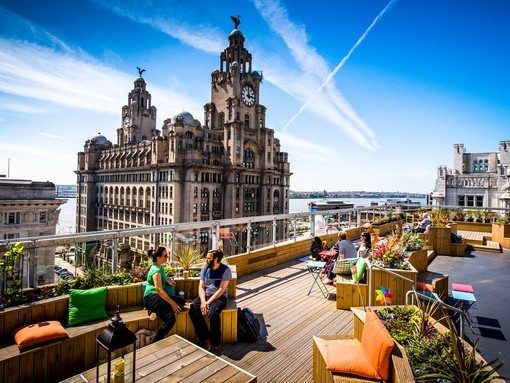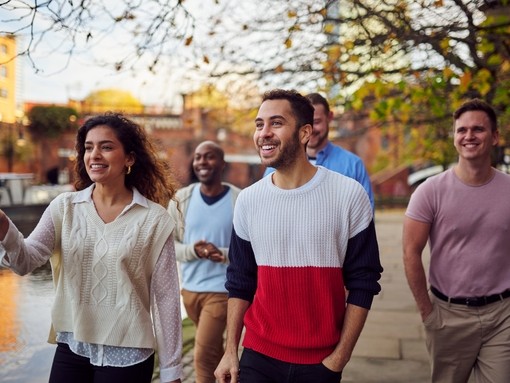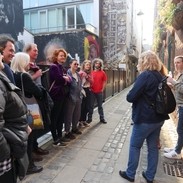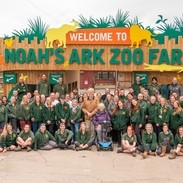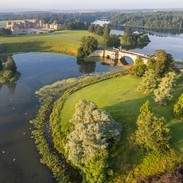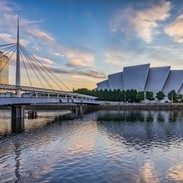Discover the real star: England
VisitBritain/Leyla Cobián
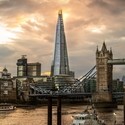
Stop 1 - London
The Path Entertainment Group/Paddington Bear Experience/Alex Brenner

Borough Market and The Globe Tavern
Bridget Jones’ Southwark flat is not an actual place open to visitors, but fans of the film can still see the exterior location used for her fictional apartment. The flat is portrayed in the movies as being above a pub called The Globe Tavern’ in Borough Market, which still exists in real life. While you cannot go inside the specific apartment, the pub and surrounding area are vibrant spots with lots to do and see. Borough Market itself is a popular destination with plenty of street food options, wine bars and restaurants.
The Crown tour of London
Brit Movies’ The Crown Tour of London is a regal journey through the heart of the capital, tracing the filming locations of Netflix’s royal drama. From the grandeur of Lancaster House, standing in for Buckingham Palace, to the stately elegance of the Old Royal Naval College in Greenwich, the tour brings to life key moments from the series. Along the way, fans can stroll through iconic royal landmarks and immerse themselves in the world of Queen Elizabeth II.
Hampton Court Palace
Located in Richmond on the banks of the River Thames, visitors can enjoy a blend of history and Hollywood at the former home of King Henry VIII. The Tudor palace stood in for the opulent residence of Queen Charlotte in the Netflix hit series Bridgerton and is a popular filming location for period dramas. Beyond the film connection, the palace has much to offer, allowing visitors to relive centuries of royal history.
Notting Hill and Portobello Road
Notting Hill and Portobello Road are iconic film locations, immortalised in the romcom Notting Hill. The colourful streets and bustling market of Portobello Road provide the charming backdrop for Hugh Grant and Julia Roberts’ love story, where visitors can stroll by the famous blue door and the travel bookshop from the film.
Wands & Wizards Exploratorium
The Wizard Exploratorium in Soho is a magical experience for fans of all things wizardry. Spread across several floors, this immersive venue features interactive exhibits, including the Magic Wand Experience, where visitors can design and create their own wands, alongside family-friendly events like potion-making classes and magical afternoon teas.
Paddington Bear Experience
Visitors can now journey through Paddington’s iconic stories at the newly opened Paddington Bear Experience in London. Join the little bear in solving puzzles, completing challenges, and exploring themed environments from his world as part of this interactive adventure.
Warner Bros. Studio Tour London – The Making of Harry Potter
Visitors can enter the magical world of Harry Potter at the Warner Bros. Studio Tour London. This immersive experience offers fans the chance to explore original sets, costumes and props used in the films, from the Great Hall at Hogwarts to Diagon Alley and Platform 9¾. Visitors can discover behind-the-scenes secrets about the production, enjoy interactive exhibits and even sample a glass of Butterbeer. Getting to the studio from central London is easy. Visitors can get the train to Watford Junction with regular shuttle buses operating from the station to the Studio Tour (15 min).
The World of Tim Burton
Visitors can immerse themselves in The World of Tim Burton at the Design Museum in Kensington, a deep dive into the surreal universe of the renowned director. This immersive exhibition, running until 21 April 2025, highlights Burton’s iconic characters, from Edward Scissorhands to Beetlejuice, through original sketches and props. Visitors can explore the creative process behind his fantastical worlds and see how Burton’s gothic imagination has shaped modern filmmaking.
Getting around
Getting around: If travelling to Hatfield House in Hertfordshire, there are direct trains from London King’s Cross to Hatfield Station (40 mins). Hatfield House is a 15-minute walk from the train station. Regular direct trains from London Paddington to Oxford take 55 minutes.
Stop 2 – Southeast England: Hertfordshire – Oxford – Hampshire
VisitBritain/Marina Comes

Highclere Castle, Hampshire
Nestled in the Hampshire countryside, Highclere Castle is renowned as the primary filming location for Downton Abbey. Its stately exterior and grand interiors serve as the fictional Crawley family home. The castle’s lavish drawing rooms, grand staircase and sprawling estate are seen throughout the series and in the Downton Abbey films. To get to the site from Oxford, take a train to Newbury, which is the nearest major train station to Highclere (40-50 mins). From Newbury, Highclere Castle is about a 15-minute taxi ride.
Bodleian Library and Christ Church College, Oxford
The Bodleian Library in Oxford is a famous filming location for the Harry Potter series, providing a magical backdrop for several iconic scenes. The library’s oldest reading room, Duke Humfrey’s Library, stood in for Hogwarts’ library, where Harry sneaks around under his invisibility cloak. The next-door vaulted Divinity School became Hogwarts hospital in The Philosopher’s Stone and The Goblet of Fire, admitting students for broomstick injuries, curses and back-firing spells. Nearby Christ Church College is where we were first introduced to Hogwarts, with Harry and the other first-year wizards ascending the 16th-century stone staircase to the Great Hall.
Blenheim Palace, Oxfordshire
Blenheim Palace in Oxfordshire, a UNESCO World Heritage Site and birthplace of Winston Churchill, has taken a starring role in Bridgerton, Mission Impossible, Cinderella, and The BFG. Its grand Baroque architecture and vast, picturesque grounds make it an ideal setting for lavish period dramas and action-packed scenes. In Bridgerton, the palace stands in for the Duke of Hastings’ country estate, while Mission Impossible used its opulent interiors for key action sequences. It’s a 30-minute drive from Oxford to Blenheim. Alternatively, there are regular buses from Oxford city centre to Woodstock, near Blenheim Palace (30-40 mins).
Didcot Railway Centre, Didcot Parkway
Didcot Railway Centre in Oxfordshire serves as a key filming location for Masters of the Air, the WWII mini-series from the creators of Band of Brothers and The Pacific. With its collection of period steam trains and authentic railway infrastructure, the centre transforms into a 1940s setting, capturing the gritty atmosphere of wartime Britain. The museum is easy to get to, with regular trains from Oxford to Didcot Parkway Station taking 15 minutes.
Hatfield House, Hertfordshire
Hatfield House, a grand Jacobean mansion in Hertfordshire, served as the interior of the Bridgerton family’s London residence in the second season of Bridgerton. With opulent interiors and rich history, the estate has been home to the Cecil family for over 400 years. Queen Elizabeth I spent much of her childhood there, adding to its royal connections.
getting around
Getting around: Trains from Oxford to Bath take one hour 30 minutes, with connections via Didcot Parkway. Alternatively, the journey takes around two hours by car.
Stop 3 – Southwest England: Bath – Wiltshire
Jane Austen Centre
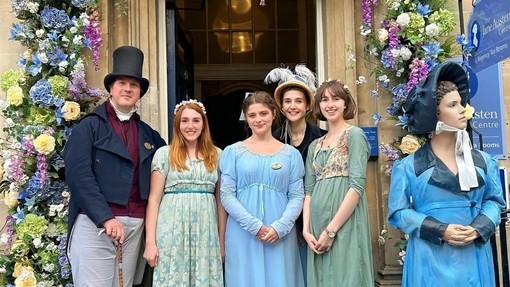
No.1 Royal Crescent, Bath
The elegant Georgian architecture of Bath created the magical backdrop for many period dramas, from Jane Austen adaptations to Netflix hit Bridgerton. The Royal Crescent and surrounding areas are also featured in the Charlie and the Chocolate Factory prequel, Wonka, adding a touch of grandeur to the famous chocolatier’s fantastical world.
Bridgerton Tour, Bath
The Bridgerton Tour of Bath invites fans of the hit Netflix series to step into the glamorous world of Regency-era society. This guided tour takes visitors to some of the show’s most iconic locations, including the Royal Crescent and the Assembly Rooms, where many of the lavish ball scenes were filmed. While exploring Bath’s cobbled streets, discover how the city’s Georgian architecture captured the opulence of the Bridgerton universe.
Abbey Green, Bath
The peaceful cobblestone square of Abbey Green had a starring role in Bridgerton’s first season, as the setting of shopping trips and dress fittings at the Modiste Dress Shop. Today it is home to a variety of quirky shops and independent restaurants. Visitors can also marvel at the giant plane tree in the centre of the square, which is one of the oldest architecturally planted trees in the world.
Lacock village
This picturesque village in Wiltshire has become a popular filming location, notably featured in Downton Abbey. Its charming medieval streets and quaint cottages stood in for early 20th-century settings in the series, offering a fitting backdrop for the period drama. The village has also been used in other productions, but Downton Abbey fans will recognise it as a key filming site for scenes set in the village of Downton. Lacock village is a 30-minute drive from Bath. If travelling by public transport, take a train to Chippenham and then bus X34 to Frome, getting off at The George.
Lacock Abbey
With its medieval and Tudor architecture, Lacock Abbey was a key filming location for Downton Abbey and other major productions. In the series, it stands in for various grand interiors and exteriors. Beyond Downton Abbey, Lacock Abbey has also appeared in Fantastic Beasts and Harry Potter. The abbey’s Warming Room – which contains a giant cauldron – was Professor Quirrell’s Defence Against the Dark Arts classroom, while Professor Snape’s Potions Class was held in the Sacristy. It was in the abbey’s Chapter House that Harry stumbled upon the Mirror of Erised, which shows the heart’s deepest desire.
getting around
Getting around: Trains from Bath Spa to Birmingham New Street (via Bristol) take around two hours.
Stop 4 – The West Midlands: Birmingham
VisitBritain/Storyman

Black Country Living Museum, Dudley
This open-air museum in Dudley, part of an area known as the ‘Black Country’ for the soot produced by its many iron foundries, is just a short train-ride from Birmingham and showcases the rich industrial heritage of the Midlands. It also served as a vivid backdrop for Peaky Blinders, featuring authentic reconstructions of local landmarks, including Charlie Strong’s scrap metal yard and the Workers’ Institute, all of which appear throughout the series.
Digbeth, Birmingham
Digbeth, a vibrant district in Birmingham, is well-known for its industrial heritage, lively food and drink scene, and its connection to the popular Peaky Blinders series. The area serves as a backdrop for many scenes, immersing fans in the gritty atmosphere of 19th-century Birmingham. Today, Digbeth has transformed into a cultural hub, boasting an eclectic mix of street art, independent shops and lively food markets. Visitors can explore its artistic flair and enjoy trendy bars and music venues.
Jewellery Quarter, Birmingham
The Jewellery Quarter is another area of Birmingham featuring prominently in Peaky Blinders to portray the city’s post-war industrial landscape. This historic area is renowned for its jewellery making heritage, boasting over 100 independent jewelry businesses and workshops. Today, visitors can explore its cobbled streets, which are lined with artisan shops, cafes and intriguing museums, including the Museum of the Jewellery Quarter.
Grand Central, Birmingham
Used to depict an airport terminal in Mission Impossible 7, Birmingham’s Grand Central station, along with the Bullring, makes up the largest shopping destination in the city, home to the likes of Selfridges, Treetop Adventure Golf and Mowgli, which serves up an array of Indian and Vietnamese-inspired food.
getting around
Getting around: Regular direct trains from Birmingham New Street to Manchester Piccadilly take one hour 20 minutes. Trains from Manchester Victoria to Liverpool Lime Street take just 40 minutes.
Stop 5 – Northwest England: Manchester – Liverpool
Heritage GB/ Jason Roberts

Northern Quarter, Manchester
Manchester’s Northern Quarter, with its blend of period architecture and industrial character, starred in Sherlock Holmes (2009). Its atmospheric streets and old warehouses made it a fitting stand-in for the 19th-century urban landscape of Sherlock Holmes’ world. Today, the Northern Quarter has evolved into a vibrant, creative hub, popular for its eclectic mix of independent boutiques, cafes and cultural venues. Known for its quirky street art, this area boasts vintage shops like Afflecks, as well as trendy spots like Matt and Phred’s jazz club and a variety of unique eateries.
Manchester Town Hall, Manchester
Manchester played a key role as a filming location for Sherlock Holmes (2009), starring Robert Downey Jr. The city’s Victorian architecture provided the perfect backdrop for 19th-century London, which is central to the film’s setting. With its grand Gothic Revival style, the iconic Manchester Town Hall on Albert Square was transformed into the interiors of the Houses of Parliament for several key scenes.
Victoria Baths,
Manchester
Victoria Baths, located on Hathersage Road in Manchester, is a stunning Grade-II-listed building. First opened in 1906, its impressive Edwardian features, including stained glass windows and beautiful mosaics, have made it a landmark in Manchester. In Peaky Blinders, the building served as the backdrop for a horse fair scene where Tommy Shelby encounters his love interest, May.
Peaky Blinders Tour of Liverpool
Experience the gritty allure of the Peaky Blinders universe on the Peaky Blinders Tour of Liverpool, an official tour that takes visitors through the locations used in the iconic series. Although the show is set in Birmingham, much of its filming took place in Liverpool, renowned for its Victorian industrial architecture. The tour not only brings the Shelby family’s story to life, but also highlights the rich history and culture of Liverpool itself. Visitors will explore Polly’s home, the spot where Tommy was attacked by Father Hughes’ henchmen, and much more.
Port Sunlight, Wirral, near Liverpool
Peaky Blinders fans can explore this picturesque village near Liverpool, built in the late 1800s as living quarters for workers at a nearby factory. One of the quaint houses is recognisable as that of Aunt Polly, played by the late Helen McCrory. Self-guided tour maps are available at the Port Sunlight Museum. A special exhibition at Bridge Cottage displays costumes from the hit TV show, including a dress worn by McCrory and a suit worn by Tom Hardy as Alfie Solomons.
Formby Beach, near Liverpool
Formby Beach, located near Liverpool, is not only celebrated for its natural beauty but also for its role in Peaky Blinders. The dramatic confrontation between Tommy Shelby and Alfie Solomons in Season 4 took place against the scenic backdrop of this coastal getaway. Known for its sandy dunes and sweeping views of the coastline, Formby Beach is a designated National Trust site and popular destination for a relaxing day out.
The Royal Liver Building, Liverpool
Located at Pier Head, be transported to Gotham as the Royal Liver Building was a key filming location for The Batman (2022). It served as the rooftop of Gotham City Police Department (GCPD), where Batman leaps from the tower in a dramatic escape scene. For a true Batman experience, visitors can take the 360 Tour of the building and enjoy the stunning views from its 15th-floor viewing platform. In addition to the Royal Liver Building, several other locations around Liverpool, such as St George’s Hall and the Walker Art Gallery, were also used to depict the superhero’s universe.
getting around
Getting around: Trains from Liverpool Lime Street station to York take around two hours, with rail travel from Manchester Victoria station to York taking around one hour 30 minutes. Alternatively, the trip to York takes just under two hours by car.
Stop 6 – Northeast England: York – Durham – Alnwick
VisitBritain/Andrew Pickett

York Minster,
York
York Minster, one of the largest Gothic cathedrals in Northern Europe, starred in The Crown as Westminster Abbey. Its stunning architecture, with stained-glass windows and towering spires, provided the backdrop for the series’ depiction of key royal events, including Queen Elizabeth II’s coronation and other important moments in British history.
Castle Howard, near York
This stately baroque mansion, with its grand interiors and landscaped gardens, featured prominently in Bridgerton as the opulent Clyvedon Castle, the home of the Duke and Duchess of Hastings. Visitors can explore its expansive gardens, which include the Skelf Island adventure playground for children. Additionally, the estate hosts various events throughout the year, from concerts to seasonal festivals. Unique architectural gems on the grounds include the Temple of the Four Winds and the Aztec Pyramid.
Durham Cathedral, Durham
With its striking gothic architecture, Durham Cathedral took a starring role in the Harry Potter series. The cathedral’s Chapter House saw Professor McGonagall teach young wizards how to transform animals into water goblets. Additionally, the cloisters served as the backdrop for other scenes, including Ron Weasley succumbing to his slug-vomiting curse in Harry Potter and the Chamber of Secrets. The cathedral’s snow-covered quadrangle also provided the setting for Harry first letting Hedwig take flight in Harry Potter and the Philosopher’s Stone.
Beamish The Living Museum of the North
Beamish Museum, a 20-minute drive from Durham, is an open-air museum located near Stanley in County Durham, England. Relive daily life in the northeast of England from the 19th and 20th centuries amid a collection of relocated and replica buildings, including a Victorian town, a 1940s farm and a coal mine. Spanning more than 350 acres, the open-air museum provided a bustling backdrop for the first film adaptation and many episodes of Downton Abbey.
Alnwick Castle
Alnwick Castle, in Northumberland, promises a dose of wizarding magic, having appeared in the first two Harry Potter films. The Outer Bailey saw Harry experience his first flying lesson, while the Inner Bailey provided the setting for the infamous Whomping Willow scene when Ron and Harry crash-land the Weasley’s flying car. Visitors can immerse themselves in the magic of the films by participating in broomstick training, exploring the beautiful gardens, and taking guided tours that delve into the castle’s rich history and its role in various films.
getting around
Getting around: The nearest main airports to Alnwick are Newcastle International Airport (40 minutes by car) or Edinburgh Aiport (two hours by car).
The nearest train station to Alnwick Castle is Alnmouth, about four miles from Alnwick. Direct trains from London King’s Cross and Newcastle stop at Alnmouth. From Alnmouth, take a taxi or bus to reach Alnwick Castle (around 10-15 minutes).


